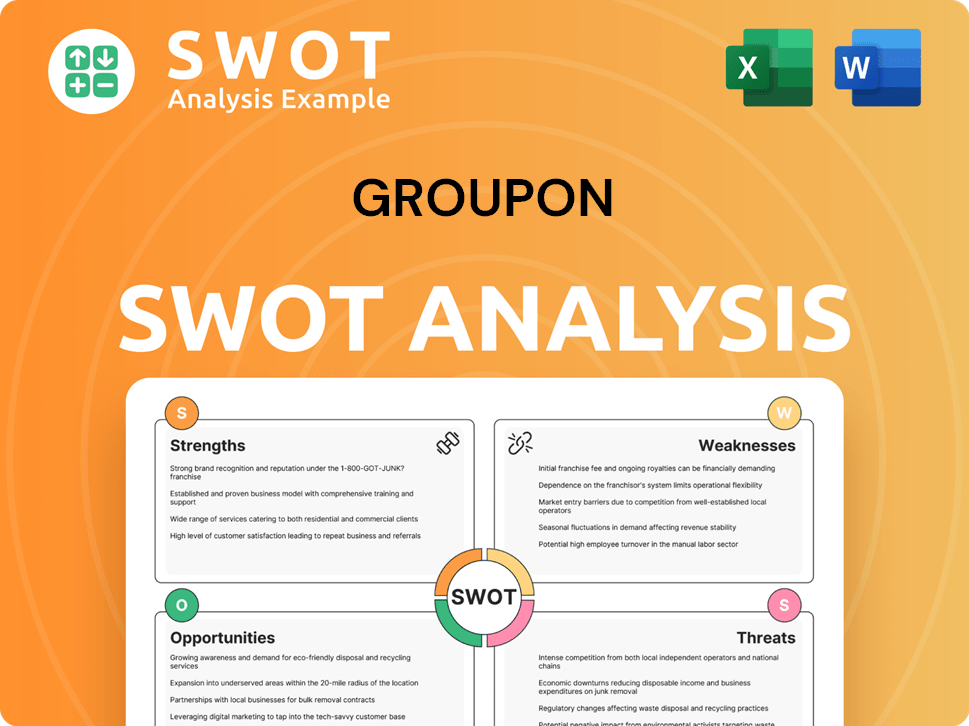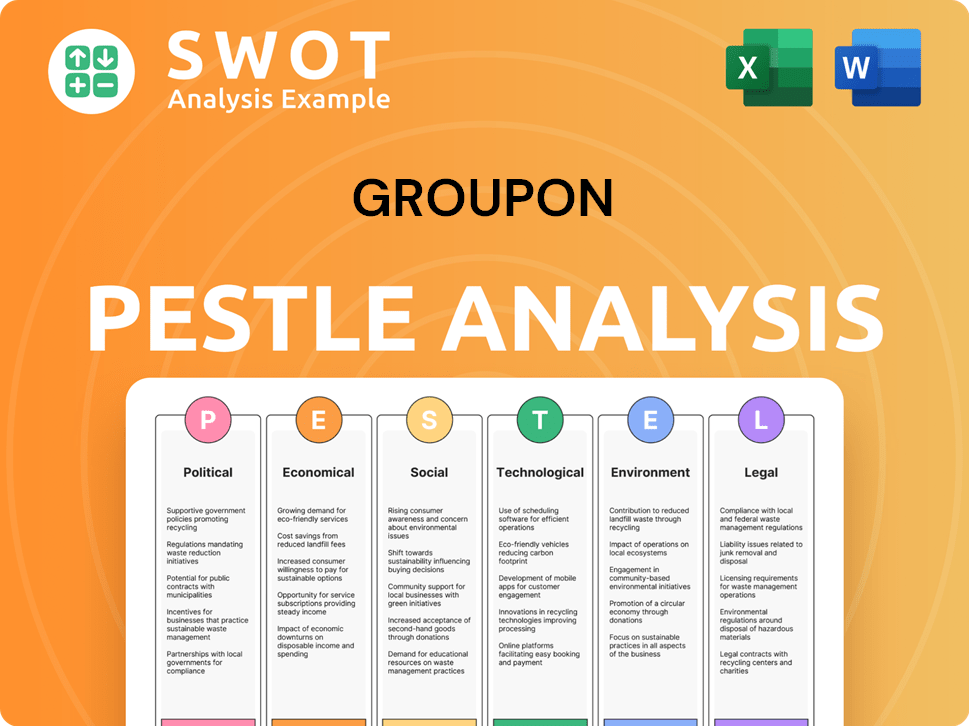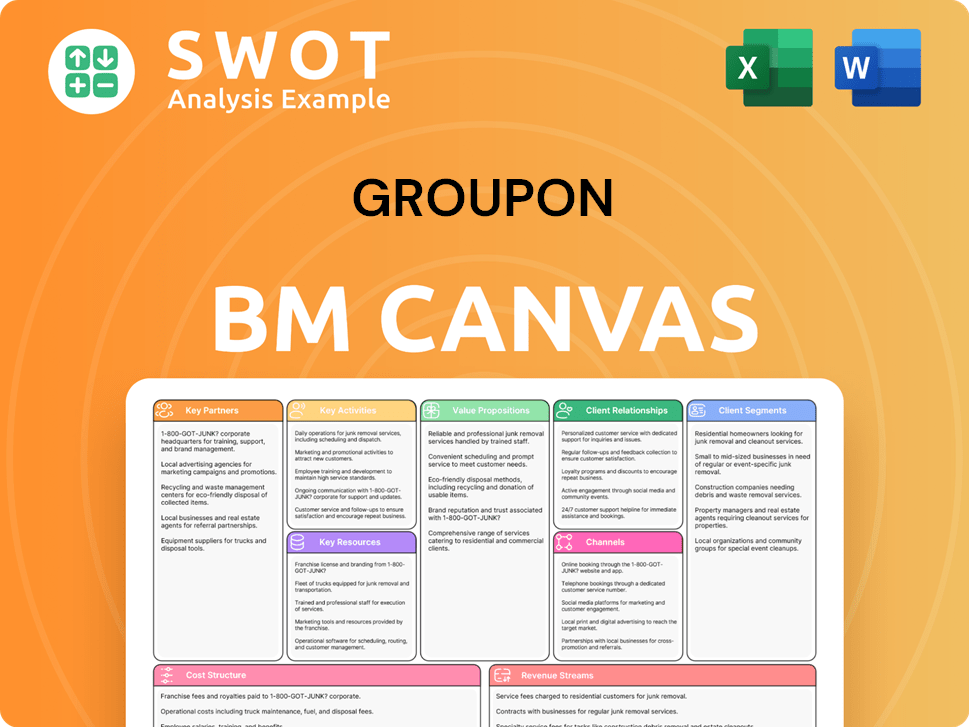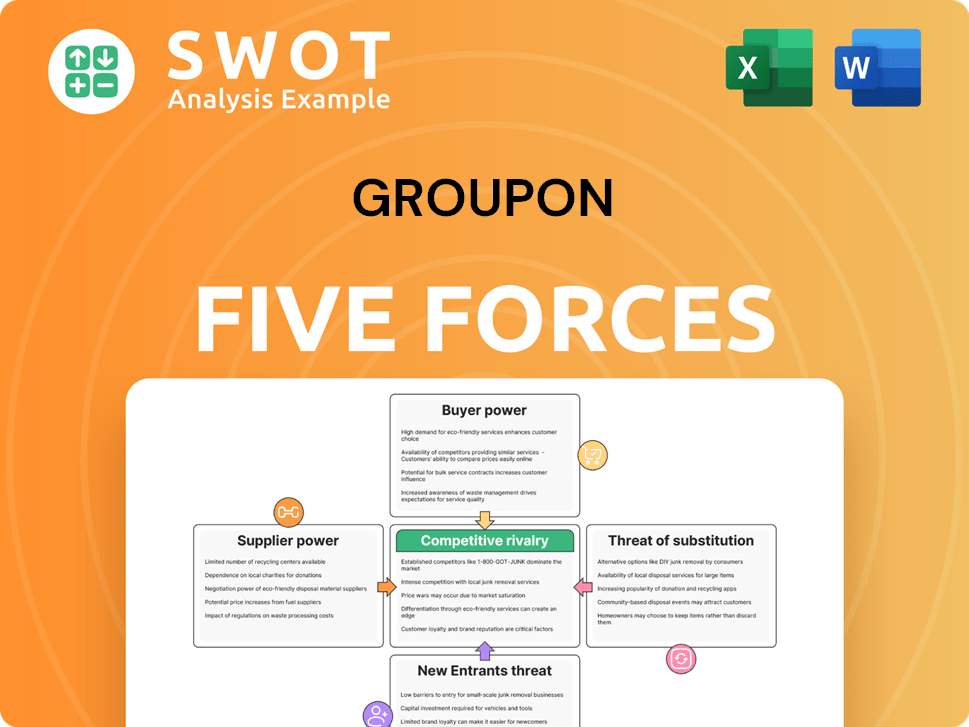Groupon Bundle
How Did Groupon Revolutionize the Daily Deal Landscape?
Dive into the fascinating Groupon SWOT Analysis and journey through the rise of a company that redefined how we discover and purchase local experiences and goods. From its humble beginnings in Chicago, Illinois, Groupon's innovative approach to e-commerce quickly captured the world's attention, offering unprecedented value to consumers and a powerful marketing tool for businesses. This exploration will uncover the key moments that shaped Groupon's story, from its origin to its current standing.

Understanding the Groupon history is crucial for anyone interested in the evolution of the Groupon company and the impact of the Groupon origin on the e-commerce sector. The company's success, built on the Groupon business model of offering compelling Groupon deals, highlights the power of collective buying and the importance of adapting to changing market dynamics. Examining the contributions of the Groupon founders and their early strategies provides valuable insights into building and scaling a successful online platform, making it a compelling case study for entrepreneurs and investors alike.
What is the Groupon Founding Story?
The story of the Groupon company begins in late 2008. It was officially launched in November of that year by Andrew Mason, marking the start of a significant player in the e-commerce sector. The company's origin is rooted in a prior project, 'The Point,' a platform designed to facilitate collective action.
Mason's observation of group buying on 'The Point' led to the creation of Groupon. The initial goal was to help local businesses gain new customers and offer consumers appealing discounts. This approach quickly gained traction, setting the stage for its rapid expansion.
The early days of Groupon involved a straightforward business model. Groupon offered a daily deal from a local business, activating the deal only if a minimum number of people purchased it. This created a win-win situation: businesses got a surge of new customers, and consumers received significant discounts. The first deal was a '2-for-1' pizza offer in Chicago. Initial funding came from Mason's personal savings and an angel investment from Eric Lefkofsky.
Groupon's launch in November 2008 marked the beginning of its journey.
- The name 'Groupon' is a combination of 'group' and 'coupon,' reflecting its core offering.
- The founding team's skills in web development and grassroots organizing were key to its quick growth.
- The economic climate of the late 2000s, during the Great Recession, boosted Groupon's appeal as consumers sought value.
Groupon SWOT Analysis
- Complete SWOT Breakdown
- Fully Customizable
- Editable in Excel & Word
- Professional Formatting
- Investor-Ready Format

What Drove the Early Growth of Groupon?
The early growth of the company, a pioneer in the daily deals market, was exceptionally rapid. Following its launch in Chicago in November 2008, the company rapidly expanded its reach, leveraging an innovative business model. This expansion was fueled by a combination of strategic marketing and a viral customer acquisition strategy, leading to significant revenue milestones.
The company's initial expansion involved launching in key cities like Boston, New York, and Toronto in 2009. The company's early success was significantly driven by word-of-mouth and email marketing, which capitalized on the appeal of its deals. By April 2010, the company had a presence in approximately 150 North American cities and around 100 cities internationally, demonstrating its rapid growth trajectory.
The company's international expansion began with its first international site in Toronto, Canada, in 2010. This was followed by aggressive expansion into Europe, Asia, and South America, often through acquisitions of local deal sites. A key acquisition was Citydeal, which accelerated its presence in Europe. The company also diversified its offerings, including 'Groupon Goods' and 'Groupon Getaways'.
In late 2010, the company famously rejected a $6 billion acquisition offer from Google, signaling its ambition to remain independent and pursue an IPO. Significant capital raises, including a $950 million funding round in January 2011, valued the company at around $15 billion. The company's initial public offering (IPO) in November 2011 raised $700 million, valuing the company at approximately $12.7 billion. The company's early success and growth are well-documented in articles like Revenue Streams & Business Model of Groupon.
Despite the emergence of numerous daily deal clones, the company maintained market leadership. This was achieved through strong brand recognition, a large merchant network, and a loyal customer base. This period highlighted the company's ability to scale a novel business model quickly and capture a significant share of the burgeoning e-commerce market. The company's early success was a testament to its innovative approach to e-commerce.
Groupon PESTLE Analysis
- Covers All 6 PESTLE Categories
- No Research Needed – Save Hours of Work
- Built by Experts, Trusted by Consultants
- Instant Download, Ready to Use
- 100% Editable, Fully Customizable

What are the key Milestones in Groupon history?
The Groupon company, since its origin, has experienced a dynamic journey marked by significant milestones, innovations, and challenges that have shaped its evolution in the e-commerce landscape.
| Year | Milestone |
|---|---|
| 2008 | Founded in Chicago by Andrew Mason and Eric Lefkofsky, initially as The Point, a platform for collective action. |
| 2009 | Launched as Groupon, pioneering the daily deals model, offering discounts on local services and products. |
| 2010 | Expanded rapidly, reaching hundreds of cities globally and becoming a dominant player in the daily deals market. |
| 2011 | Introduced 'Groupon Goods,' expanding beyond local services to include physical products, and launched 'Groupon Getaways' for travel deals. |
| 2011 | Went public with an IPO, raising significant capital but facing scrutiny over its valuation. |
| 2013 | Andrew Mason, one of the Groupon founders, was ousted as CEO, marking a significant leadership change. |
| 2015-2018 | Implemented strategic pivots, focusing on a broader e-commerce marketplace and streamlining international operations. |
| 2020-2024 | Continued to adapt to market changes, emphasizing profitability, efficiency, and a curated selection of deals. |
Groupon's innovations centered around the daily deal model, which offered consumers access to discounted services and products. This model, coupled with its rapid expansion, initially disrupted the local commerce landscape and set the stage for its early success.
The core innovation was the daily deal model, offering significant discounts on local services and products, attracting a large customer base. This model helped to acquire new customers for businesses.
Groupon quickly expanded to hundreds of cities worldwide, capitalizing on the demand for deals and establishing a global presence. This rapid growth was a key feature of Groupon's early days.
The introduction of 'Groupon Goods' and 'Groupon Getaways' expanded its offerings beyond local services, tapping into the broader e-commerce market. This diversification was an important part of the Groupon business model.
Recognizing the importance of mobile commerce, Groupon invested in its mobile platform to enhance user experience and accessibility. This investment helped Groupon's marketing strategies.
Groupon developed tools and analytics to improve the merchant experience, providing data-driven insights and support. This was a key part of Groupon's strategy.
Shifting from a pure daily deal site to a broader e-commerce marketplace, Groupon emphasized personalization and a more curated selection of deals to enhance user engagement. This helped Groupon's financial performance.
Groupon faced challenges including market saturation due to competitors. Concerns about the sustainability of the daily deal model, including 'deal fatigue' among consumers and questions about merchant profitability, began to emerge.
The rapid proliferation of competitors attempting to replicate its model led to market saturation and increased pressure on deal margins. This impacted Groupon's growth over time.
Concerns about 'deal fatigue' among consumers and questions about merchant profitability began to emerge, impacting the sustainability of the daily deal model. This was a key challenge for Groupon's founders.
Groupon grappled with accounting issues and management transitions, including the ousting of founder Andrew Mason as CEO in 2013. This impacted Groupon's IPO date.
Groupon faced intense competition from larger e-commerce players and evolving consumer preferences for discovery and purchasing. This affected Groupon's current status.
Internal and external pressures led to a significant decline in its stock price from its IPO highs. This affected Groupon's financial performance.
Groupon streamlined its international operations, divesting from some less profitable markets, highlighting challenges in global expansion. This affected Groupon's expansion to international markets.
Groupon Business Model Canvas
- Complete 9-Block Business Model Canvas
- Effortlessly Communicate Your Business Strategy
- Investor-Ready BMC Format
- 100% Editable and Customizable
- Clear and Structured Layout

What is the Timeline of Key Events for Groupon?
The Groupon company has a dynamic history, marked by rapid expansion, significant financial milestones, and strategic shifts. From its Groupon origin in Chicago to its current status as a leading local experiences marketplace, the company's journey reflects the evolution of e-commerce and the changing dynamics of consumer behavior. Understanding the key events in the Groupon history provides valuable insights into its business model and future prospects.
| Year | Key Event |
|---|---|
| November 2008 | Groupon officially launched in Chicago, marking the beginning of its daily deals platform. |
| April 2010 | The company expanded rapidly, operating in 150 North American cities and 100 cities internationally. |
| October 2010 | Groupon reportedly rejected a $6 billion acquisition offer from Google. |
| January 2011 | Groupon secured a $950 million funding round, valuing the company at approximately $15 billion. |
| November 2011 | Groupon went public with an IPO, raising $700 million and valuing the company at roughly $12.7 billion. |
| February 2013 | Co-founder Andrew Mason was replaced as CEO. |
| 2015-2016 | Groupon divested from several international markets to streamline operations. |
| 2020 | The company navigated the impact of the COVID-19 pandemic, which significantly affected local commerce. |
| 2023-2024 | Groupon focused on a strategic turnaround, aiming for profitability and sustained growth, with a new partnership announced in May 2024. |
Groupon is concentrating on strengthening its position as a leading local experiences marketplace. This involves enhancing the technology platform to improve user experience and personalization. The company is also expanding its merchant base to offer a more diverse range of deals.
In Q4 2023, Groupon reported revenue of $125.6 million, with improvements in North America Local gross profit. The company is focused on achieving sustained profitability and positive free cash flow. The long-term goal is to drive higher purchase frequency and customer lifetime value.
Industry trends such as the growth of online local search and the demand for personalized experiences will impact Groupon. The company faces competition from e-commerce platforms and niche local service providers. However, its established brand recognition provides a competitive advantage.
Groupon aims to adapt to evolving market dynamics and effectively leverage its platform to consistently deliver value to both consumers and merchants. A recent partnership with a financial services company to offer financing solutions to its merchants demonstrates a commitment to supporting its business partners. The company's future hinges on these strategic moves.
Groupon Porter's Five Forces Analysis
- Covers All 5 Competitive Forces in Detail
- Structured for Consultants, Students, and Founders
- 100% Editable in Microsoft Word & Excel
- Instant Digital Download – Use Immediately
- Compatible with Mac & PC – Fully Unlocked

Related Blogs
- What is Competitive Landscape of Groupon Company?
- What is Growth Strategy and Future Prospects of Groupon Company?
- How Does Groupon Company Work?
- What is Sales and Marketing Strategy of Groupon Company?
- What is Brief History of Groupon Company?
- Who Owns Groupon Company?
- What is Customer Demographics and Target Market of Groupon Company?
Disclaimer
All information, articles, and product details provided on this website are for general informational and educational purposes only. We do not claim any ownership over, nor do we intend to infringe upon, any trademarks, copyrights, logos, brand names, or other intellectual property mentioned or depicted on this site. Such intellectual property remains the property of its respective owners, and any references here are made solely for identification or informational purposes, without implying any affiliation, endorsement, or partnership.
We make no representations or warranties, express or implied, regarding the accuracy, completeness, or suitability of any content or products presented. Nothing on this website should be construed as legal, tax, investment, financial, medical, or other professional advice. In addition, no part of this site—including articles or product references—constitutes a solicitation, recommendation, endorsement, advertisement, or offer to buy or sell any securities, franchises, or other financial instruments, particularly in jurisdictions where such activity would be unlawful.
All content is of a general nature and may not address the specific circumstances of any individual or entity. It is not a substitute for professional advice or services. Any actions you take based on the information provided here are strictly at your own risk. You accept full responsibility for any decisions or outcomes arising from your use of this website and agree to release us from any liability in connection with your use of, or reliance upon, the content or products found herein.